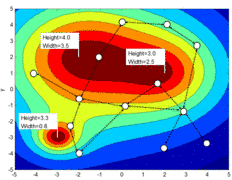New project begins in January 2015
In-Network-Data Analysis of spatially distributed quantities

Example for a 2-dimensional distribution of a physical property and description by location, amplitude and spreading of areas with extreme values. Measurements are only available at the marked locations of the sensor nodes. The network shall find an overall picture of the distribution with a communication volume as low as possible.
A new project on analysis of spatially distributed data starts in January 2015. It is the second project following the ‘Intelligent Container‘ project. After a first project on ![]() mold/fungi detection, we now put the focus on In-Network-Processing. With this method we want to analyze spatial data, which have been captured by sensor networks.
mold/fungi detection, we now put the focus on In-Network-Processing. With this method we want to analyze spatial data, which have been captured by sensor networks.
Goals and motivation
With the use of wireless sensor networks, it is now feasible to measure the spatial distribution of physical quantities in high resolution. Example applications include temperature monitoring inside a reefer container carrying food products or measurement of harmful chemicals in a lake after an accident.
The sensor nodes’ battery has to survive for several months or even years. The energy consumption has to be reduced as much as possible. Especially the amount of data wirelessly transmitted has to be limited.
The end user is mostly interested in a useful interpretation of the data or a model based description of the spatial distribution. This can be a list of locations, height and width of regions with extreme values, such as the hot-spots in a temperature profile or the location of sources of disturbances. Different models, e.g. from image processing and geo-statistics will be compared to find the best performance solution. Model parameters will be calculated directly on the sensor nodes.
The goal is to reduce the communication volume by In-Network-Processing in two ways:
- First, the external communication only consists of the estimated model parameters instead of full sensor records.
- And second – being the major focus of the project – the communication between neighboring sensors should also be reduced during the parameter estimation process.
The data exchange between neighbors should mostly consist only of parameters and compressed information.
Framework
The project is sponsored by the German Research Foundation (DFG) for two years (2015/16). Research is carried out in cooperation with the Institute for Microsensors, -actuators and -systems (IMSAS) and the Department of Communications Engineering (ANT), both at the University Bremen.
Contact
Dr.-Ing. Reiner Jedermann ![]()
Institute for Microsensors, -actors and –systems (IMSAS) ![]() www.imsas.uni-bremen.de
www.imsas.uni-bremen.de
Dr.-Ing. Henning Paul ![]()
Department of Communications Engineering (ANT)![]() www.ant.uni-bremen.de
www.ant.uni-bremen.de
University Bremen, FB1, Otto-Hahn-Allee NW1, 28359 Bremen, Germany
Further project information is currently only available in German language: [![]() Projekt Flyer]
Projekt Flyer]






